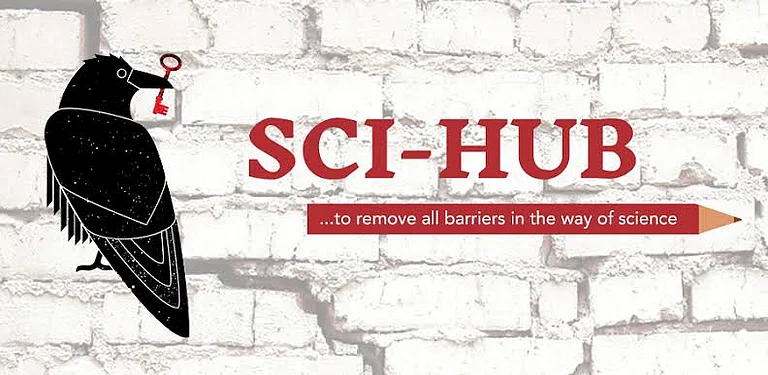 Summary of this article Summary of this article
- The Delhi High Court banned Sci-Hub and Sci-Net, sparking debates over access to scholarly research in India.
- Academic labour often goes unpaid while publishing corporations profit from subscription paywalls.
- Open-access alternatives and public funding are proposed to democratize access to knowledge.
The Delhi High Court judgement in August this year banning shadow library sites Sci-Hub and Sci-Net through Internet Service Providers (ISPs) is the latest shot fired in a raging war. One could ask how meaningful such bans are in the face of Virtual Private Networks (VPNs) as well as other “censorship-resistant technologies”—as Sci-Hub and Sci-Net founder Alexandra Elbakyan calls them—that could potentially be used to bypass such bans. Or, we could debate the evolving nature of Intellectual Property Rights (IPR) law, its interpretation by courts (including by the Delhi High Court itself in other cases) and enforcement in practice in India, which are political questions for the country at large to settle over time.
What is clear is that the two sides are not equally matched. The wealth at the disposal of large corporations allows them to tie up the resources of the judicial system (court time) to protect their profit. Among the plaintiffs is Elsevier, the Netherlands-based publishing giant. The arm of its parent company under which the publishing business is nested reported operating profits of GBP 1.17 billion (USD 1.57 billion) in 2024.
At the heart of it is this set of questions. Whose time, labour and dedication to creating and sharing knowledge does academia run on? And so, to whom should research be accessible? At what cost? Who profits, and ultimately, who benefits? Answers to these reveal deep problems with the current model.
[url=]Related Content[/url]
  Delhi High Court Allows Natco Pharma to Sell Generic Risdiplam, Dismisses Roche Plea Delhi High Court Allows Natco Pharma to Sell Generic Risdiplam, Dismisses Roche Plea
  Eli Lilly To Invest Over USD1 Bn In Contract Manufacturing Expansion In India, Sets Up New Hub In Hyderabad Eli Lilly To Invest Over USD1 Bn In Contract Manufacturing Expansion In India, Sets Up New Hub In Hyderabad
  Calcutta High Court Rules Deportation Illegal, Orders Return Of Six West Bengal Residents From Bangladesh Calcutta High Court Rules Deportation Illegal, Orders Return Of Six West Bengal Residents From Bangladesh
  Jail, Not Bail: Like Umar Khalid, Many Suffer Jail, Not Bail: Like Umar Khalid, Many Suffer
[url=]Related Content[/url]
  Delhi High Court Allows Natco Pharma to Sell Generic Risdiplam, Dismisses Roche Plea Delhi High Court Allows Natco Pharma to Sell Generic Risdiplam, Dismisses Roche Plea
  Eli Lilly To Invest Over USD1 Bn In Contract Manufacturing Expansion In India, Sets Up New Hub In Hyderabad Eli Lilly To Invest Over USD1 Bn In Contract Manufacturing Expansion In India, Sets Up New Hub In Hyderabad
  Calcutta High Court Rules Deportation Illegal, Orders Return Of Six West Bengal Residents From Bangladesh Calcutta High Court Rules Deportation Illegal, Orders Return Of Six West Bengal Residents From Bangladesh
  Jail, Not Bail: Like Umar Khalid, Many Suffer Jail, Not Bail: Like Umar Khalid, Many Suffer
 
Delhi High Court Orders Blocking of Sci-Hub, Sci-Net And Mirror Websites In Copyright Infringement Case
BY Outlook News Desk
One of the most pressing issues in higher education is access to resources in general, such as state investment in education, and academic resources in particular. For students of the natural and applied sciences, academic resources include published literature, but also labs and equipment. For students of the humanities and social sciences, access to literature and repositories is almost the entirety of the resources they need. Putting these behind a high paywall is a bad idea with debilitating consequences for students across disciplines. Sites like Sci-Hub, Sci-Net and Libgen— workarounds to bypass these barriers—are caught falling foul of the law on the issue of piracy. (Note that Libgen was not a party in this legal case.)
But we would do well to pause and remember the stakes here: what we are talking about is scholarly articles, not contraband. Many activists and public intellectuals believe access to knowledge is a human right. What makes it particularly outrageous is that the bulk of the labour that goes into research and publication doesn’t even come from the publishing giants that harvest the profits. Writing and peer review—the two pillars of academic publishing—are both forms of unremunerated labour performed by scholars working individually or in collaboration. This allows for huge profit margins, rivalling those of tech giants. |